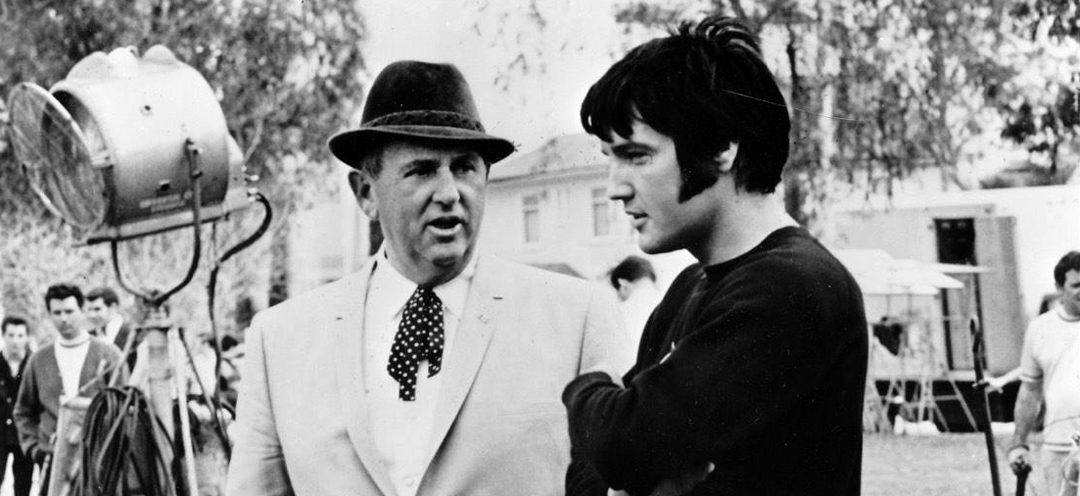Baz Luhrmann’s biographical film ‘Elvis’ as well as Netflix’s ‘Return of the King: The Fall and Rise of Elvis Presley’ shed light on the financial dealings between the legendary musician Elvis Presley and his infamous manager Colonel Tom Parker. The film even depicts that Parker earned a significant part of the singer’s revenue to the point where the latter starts to owe money to his manager. Considering the financial partnership between Elvis and Parker, the truth is not drastically different from the semi-fictionalized movie. Parker not only earned a fortune from the revenue Elvis generated but also justified his actions when he came under scrutiny. The truth about the money Parker earned from his client was completely unraveled after Elvis’ untimely death!
Parker Earned up to 50% of Elvis’ Income
Before becoming the manager of Elvis Presley, Colonel Tom Parker served as the representative of several musicians, ranging from Gene Austin to the country singer Hank Snow. However, becoming Elvis’ manager turned his life around. Parker earned around 25-50% of Elvis’ revenue during his lifetime. Alanna Nash, renowned music journalist and the biographer who wrote ‘The Colonel: The Extraordinary Story of Colonel Tom Parker and Elvis Presley,’ estimated Elvis’ gross earnings to be $200 million, out of which around $100 million was reportedly earned by Parker as the singer’s manager.

According to the Los Angeles Times, Elvis earned around $130,000 a night for concerts in the mid-1970s. The singer also earned $250,000 in royalties for each new album he released. The producers who signed him for their movies had to yield to the demand of $1 million per film. In addition, it didn’t take long for Elvis to become a brand. A 1956 Wall Street Journal report states that Elvis earned $22 million selling merchandise alone in the preceding months. Parker had an equal or a considerable share in all these income streams despite the industry average of a manager’s share being 10-25% at the time.
In 1973, Elvis sold his catalog comprising more than 1,000 songs for just $5.4 million following the guidance of Parker. Even after the death of Elvis, Parker profited considerably from the singer. He established Factors Etc. following Elvis’ demise to control the singer’s merchandise. Parker owned 56% of the company while the singer’s estate only owned 22%. Although an exact figure is not available concerning Parker’s earnings from Elvis, the manager’s net worth at some point in his life was estimated to be around $100 million. A lion’s share of it was earned through managing the globally renowned singer.
Parker never saw his earnings, which were way more than the industry standard, as “stealing.” When British journalist Chris Hutchins asked him about taking 50% of everything Elvis earned, Parker replied that the singer was taking “fifty percent of everything I earn,” which explains his mentality. Furthermore, Parker’s decisions did affect Elvis’ revenue severely. The manager never encouraged his client to sign with BMI for performance royalties as a songwriter. Joe Moscheo, the leader of the Imperials, learned that “the Colonel would not allow Elvis to sign anything that Parker didn’t understand or agree to, and evidently, he didn’t understand what all of this performance thing meant. It was just an oversight, but there were hundreds of thousands of dollars that Elvis never received as a songwriter,” as per Nash’s ‘The Colonel.’
Even though Parker never believed that he was stealing from Elvis, the law did. When the Elvis Presley Estate went to court against Parker, Judge Joseph Evans appointed attorney Blanchard E. Tual to investigate Parker’s compensation agreement. Tual charged Parker and Elvis’ label RCA with collusion, conspiracy, fraud, misrepresentation, bad faith, and overreaching, “asserting the record company paid off Parker to keep Elvis quiet and obedient while the label cheated ‘the most popular American folk hero of this century,’” as per Nash’s book. “Tual was stunned at the hold Parker seemed to have over the very people he had defrauded out of a fortune — $7 million or $8 million in the last three years alone, he estimated,” the author added.
Colonel Tom Parker’s Net Worth at the Time of His Death
The legal dispute between Parker and the Elvis Presley Estate was settled out of court, with the former earning $2 million from RCA for turning over master copies of the singer’s audio recordings and 350 concert, movie, and TV clips to the estate. As part of the settlement, he was prohibited from using the Elvis brand/name for five years. Despite earning millions from Elvis, Parker lost a major share of the same on the gambling tables of Las Vegas. He owed $30 million to Las Vegas Hilton, where he worked as a consultant until he died. Therefore, Colonel Tom Parker’s net worth at the time of his death in 1997 was around $1 million, which is equal to $1.9 million today considering the inflation. If he hadn’t lost his money due to gambling, his net worth in 1997 might have been around $270 million.
Read More: Was Colonel Tom Parker Responsible for Elvis’ Death?


You must be logged in to post a comment.